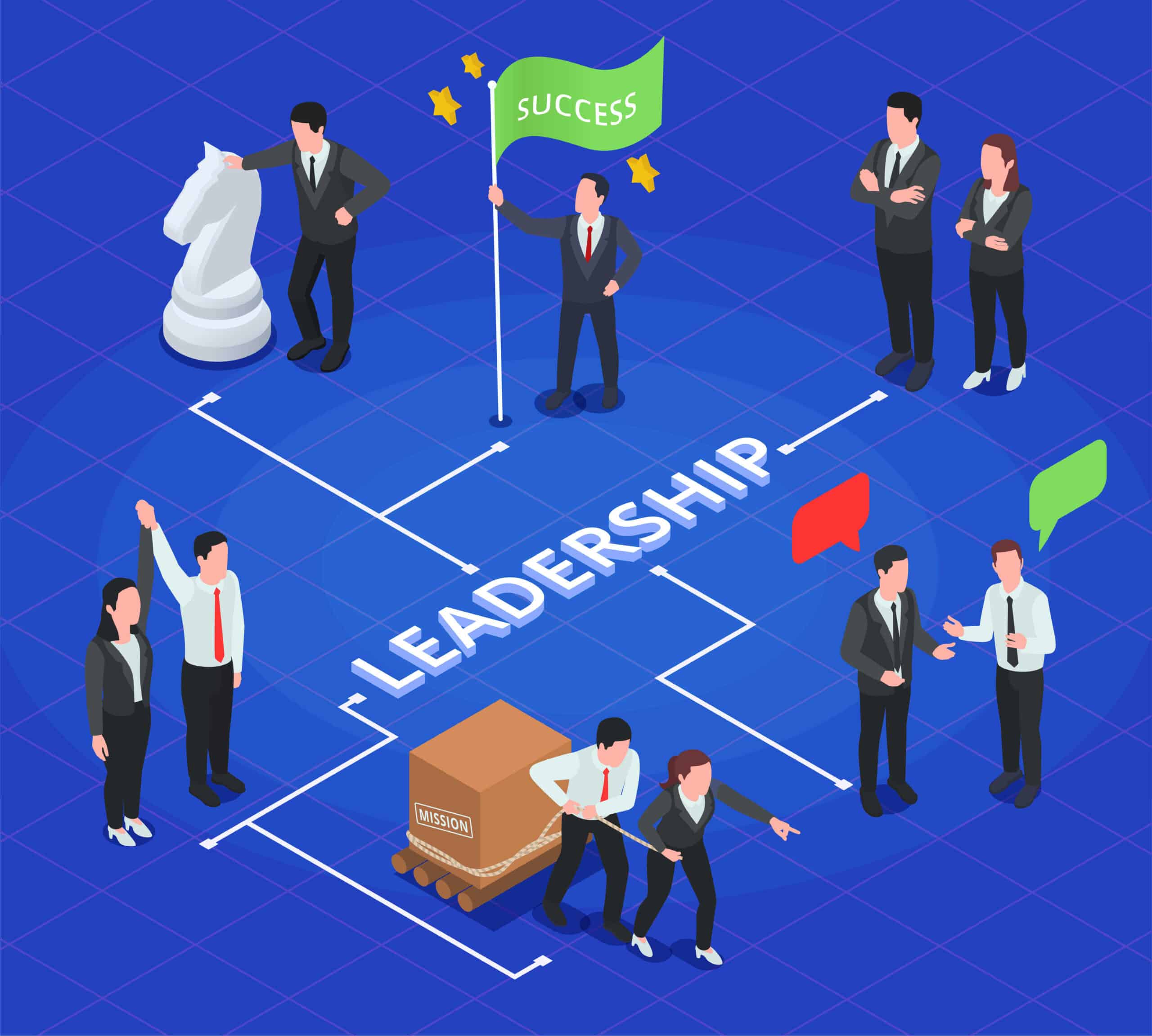Leadership skills are a vital component of success in today’s world. Whether you’re a manager leading a team at work, a volunteer organizing a community project, or a coach guiding your team, strong leadership skills are essential to achieving your goals and creating positive outcomes. In this article, we’ll explore the importance of leadership skills, identify key traits for effective leadership, and offer practical tips for building a foundation of strong leadership skills that will enhance your ability to succeed in any endeavor.
10 Important Leadership Skills in the Modern Workplace
Leadership skills play a crucial role in the modern workplace, contributing to the success and well-being of both individuals and organizations. The ability to lead effectively can make the difference between a team that thrives and one that struggles. Here are some key reasons highlighting the importance of leadership skills:
Inspiration and Motivation:
Effective leaders articulate a compelling vision, align team members with common goals, and create a sense of purpose. This motivation contributes to increased engagement and productivity.
Adaptability and Change Management: Skills of a Leader
Guide teams through transitions, fostering adaptability, and maintaining stability during periods of uncertainty.
Decision-Making and Problem-Solving: Skills of a Leader
Make informed and timely decisions, considering various perspectives, and solving complex problems. This skill is essential for overcoming challenges and driving success.
Effective Communication: Skills of a Leader
Convey ideas, expectations, and vision clearly to team members. Good communication fosters understanding, builds trust, and minimizes misunderstandings within the workplace.
Building and Leading Teams:
Understand the strengths of each team member, promote collaboration, and create an inclusive culture. Effective leadership triggers innovation, creativity, and overall team success.
Employee Development:
Recognize individual potential and actively support their professional growth. Contribute to the overall talent pool and organizational success.
Accountability and Responsibility: Skills of a Leader
Set an example by taking accountability for actions and decisions. This encourages a culture where individuals own their actions, while continuously striving for improvement.
Strategic Thinking: Skills of a Leader
Ability to think strategically, understanding the broader goals and align day-to-day activities with long-term objectives. This skill ensures that efforts are focused on meaningful outcomes.
Emotional Intelligence: Skills of a Leader
Contribute to effective interpersonal relationships, conflict resolution, and the creation of a positive workplace culture.
Crisis Management: Skills of a Leader
During challenging times or crises, strong leadership is essential. Leaders guide their teams through adversity, maintaining composure, providing direction, and instilling confidence in the organization’s ability to overcome challenges.
How Leadership Skills Impact Success
Whether you’re leading a team at work or volunteering in your community, your leadership skills will impact your ability to succeed. Strong leadership skills can help you stay focused on your goals, inspire and motivate team members, and navigate complex challenges with ease.
Leaders who possess strong emotional intelligence and empathy are better equipped to understand the needs of their team members and build strong relationships based on trust and mutual respect. Effective communication management enables leaders to convey their vision and goals clearly and effectively, while problem-solving abilities help them to overcome obstacles and find creative solutions to challenges as they arise.
Ultimately, leadership skills are essential for success in any area of life. Whether you’re leading a team, running a business, or simply trying to make a positive impact on the world around you, strong leadership skills will help you achieve your goals and make a difference.
Building a Strong Leadership Foundation
To become an effective leader, it’s essential to build a strong foundation of leadership skills that will enable you to achieve your goals and create positive outcomes. The following are some practical tips for building a foundation of strong leadership skills:
Developing a Personal Leadership Style Skills of a Leader
Effective leaders develop a personal leadership style that aligns with their strengths, personality, and values. To develop your personal leadership style, take time to reflect on your strengths and weaknesses, ask for feedback from others, and seek out mentorship and guidance from successful leaders. As you develop your personal leadership style, focus on building strong relationships based on trust, respect, and empathy, setting clear goals and expectations, and holding yourself and others accountable for their performance.
One way to develop a personal leadership style is to study the leadership styles of successful leaders. For example, Steve Jobs was known for his visionary leadership style, while Oprah Winfrey is known for her empathetic and authentic leadership style. By studying the leadership styles of successful leaders, you can gain insights into what works and what doesn’t work and develop a leadership style that is authentic to you.
Learning from Successful Leaders Skills of a Leader
One of the best ways to build a foundation of strong leadership skills is to learn from successful leaders who have achieved their goals and created positive outcomes. Seek out mentorship and guidance from leaders in your field, read books and articles about successful leadership, and attend conferences and networking events to meet and learn from other leaders.
When seeking out mentorship and guidance from successful leaders, be proactive and intentional. Identify leaders who you admire and respect, reach out to them, and ask for their advice and guidance. Show them that you value their time and expertise by coming prepared with specific questions. And be open to feedback and constructive criticism.
Embracing Continuous Learning and Growth
Finally, to become an effective leader, it’s essential to embrace continuous learning and growth. Stay current with trends and developments in your field, seek out new challenges and opportunities to stretch your skills, and reflect on your experiences to identify areas for improvement and growth. By embracing continuous learning and growth, you’ll be better equipped to lead your team towards success and achieve your goals.
Seek out opportunities for professional development. This could include attending conferences and workshops, taking online courses, or pursuing advanced degrees or certifications. Additionally, seek out feedback from your team and colleagues, and use that feedback to identify areas for improvement and growth.
Enhancing Team Management Skills
To be an effective leader, it’s essential to enhance your team management skills and build a culture of trust, respect, and collaboration that fosters positive outcomes. The following are some practical tips for enhancing your team management skills:
Building Trust and Rapport with Team Members
Effective leaders build trust and rapport with team members by communicating clearly, actively listening, showing empathy and understanding, and providing feedback and direction in a constructive and supportive manner. Leaders who prioritize building trust and rapport with team members are better equipped to create a positive work environment that fosters motivation, collaboration, and productivity.
Delegating Tasks Effectively
Effective leaders delegate tasks effectively to team members based on their skills, strengths, and interests. Leaders who delegate effectively are able to leverage the talents of their team members and achieve their goals more efficiently and effectively. Leaders must also provide clear instructions and expectations, monitor performance, and provide feedback and support as needed.
Encouraging Collaboration and Teamwork
Finally, effective leaders encourage collaboration and teamwork by fostering a culture of communication, respect, and collaboration. Leaders must set clear goals and expectations, break down silos and encourage cross-functional collaboration, and recognize and reward team members who contribute to positive outcomes. Leaders who prioritize collaboration and teamwork are better equipped to create a positive and productive work environment that enables their team to achieve their goals and create positive outcomes.
How an employee app helps foster and apply leadership skills?
An employee app can be a valuable tool for fostering and applying leadership skills within an organization. Here’s how such an app helps:
Communication and Transparency: Skills of a Leader
Employee apps facilitate transparent communication between leaders and team members. Leaders can use the app to share important updates, company news, and organizational goals, fostering an open and transparent communication culture.
Accessibility and Availability:
Leaders can be more accessible to their in-office and remote teams through an employee app. This accessibility allows for quick communication, feedback, and support, promoting a sense of connection and trust between leaders and employees.
Real-time Feedback and Recognition:
Leaders can use employee apps to provide real-time feedback and recognition to their team members. Recognizing and appreciating individual and team achievements helps motivate employees and reinforces positive behaviors.
Goal Setting and Alignment: Skills of a Leader
Employee apps can be used to set and communicate goals, ensuring that everyone is aligned with the organization’s objectives. Leaders can track progress, provide guidance, and adjust goals as needed, fostering a results-oriented culture.
Training and Development: Skills of a Leader
Leaders can leverage employee apps for training and development initiatives. This includes sharing learning resources, organizing webinars, and providing opportunities for skill-building, allowing leaders to actively contribute to the professional growth of their teams.
Collaboration and Team Building: Skills of a Leader
Leaders can use the app to foster collaboration and team building. Features such as group chats, forums, and project collaboration spaces create a sense of community and encourage teamwork, both of which are vital for effective leadership.
Employee Surveys and Feedback:
Leaders can gather valuable insights from employees through surveys and feedback forms within the app. This feedback loop helps leaders understand employee concerns, gather ideas, and make data-driven decisions to improve the work environment.
Crisis Communication: Skills of a Leader
In times of crisis or change, leaders can use the employee app to communicate important information promptly. This ensures that employees receive timely updates and understand the organization’s response, helping to manage uncertainty and build trust.
Recognition Programs:
Employee apps can support recognition programs initiated by leaders. Leaders can use the app to publicly acknowledge and reward outstanding performance, reinforcing a positive and appreciative workplace culture.
Well-being Initiatives:
Leaders can promote employee well-being through the app by sharing resources on mental health, wellness programs, and work-life balance tips. This demonstrates a commitment to the holistic development and happiness of the workforce.
Data Analytics for Decision-Making:
Employee apps often come with analytics features that leaders can use to gather data on employee engagement, usage patterns, and communication effectiveness. This data can inform leaders’ decisions and strategies for better leadership outcomes.
By integrating leadership principles into the functionality of a team app, organizations can create a work environment that not only facilitates communication but also actively supports the application of leadership skills in various aspects of employee management, engagement and development.
Want to create and achieve leadership success for your organization?
Trust HubEngage to deliver it on a platter
HubEngage offers a range of tools that enable leaders to communicate effectively with their teams, share important information, and maintain an open and transparent dialogue. Add to this features for employee feedback, internal social networking, and gamified recognition, and you’ve got a real winner of an app. Additionally, leaders can gather insights from their teams, understand employee sentiments, and make data-driven decisions. Such capabilities are vital for successful leadership, especially in fostering a sense of connection and alignment within the organization.
Book a Demo today, and see for yourself, why HubEngage is the best employee app ready to redefine planned success for organizations in 2024.













